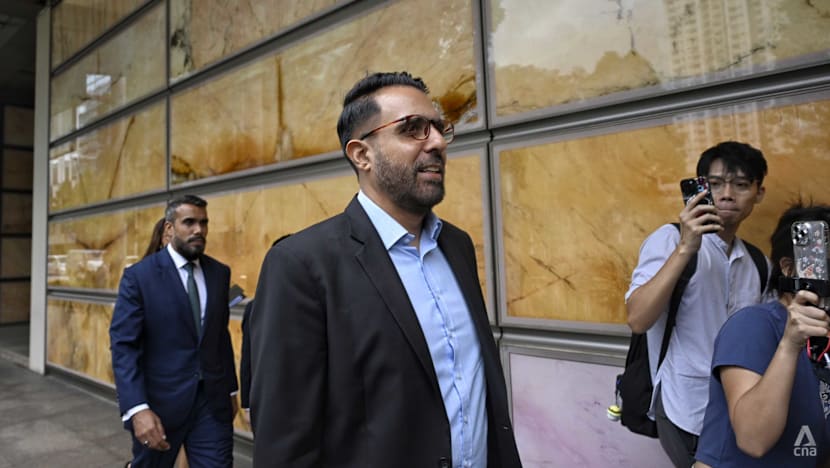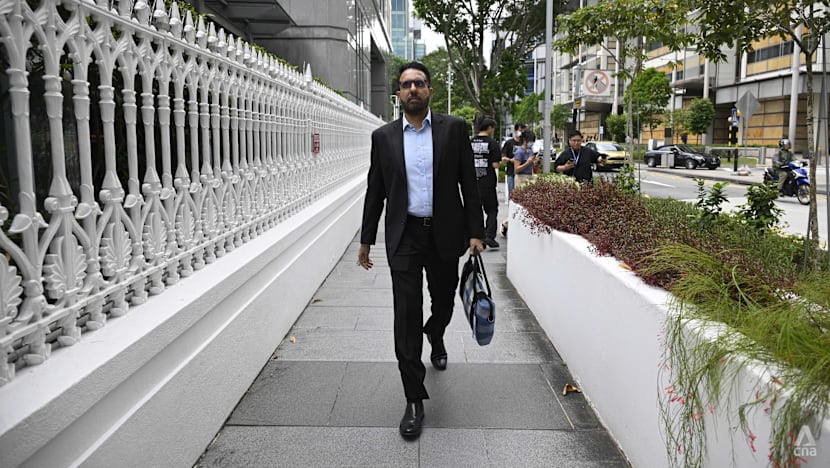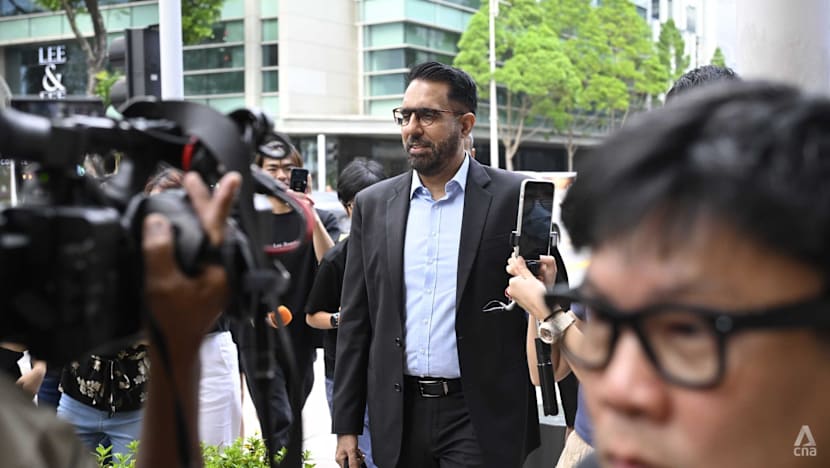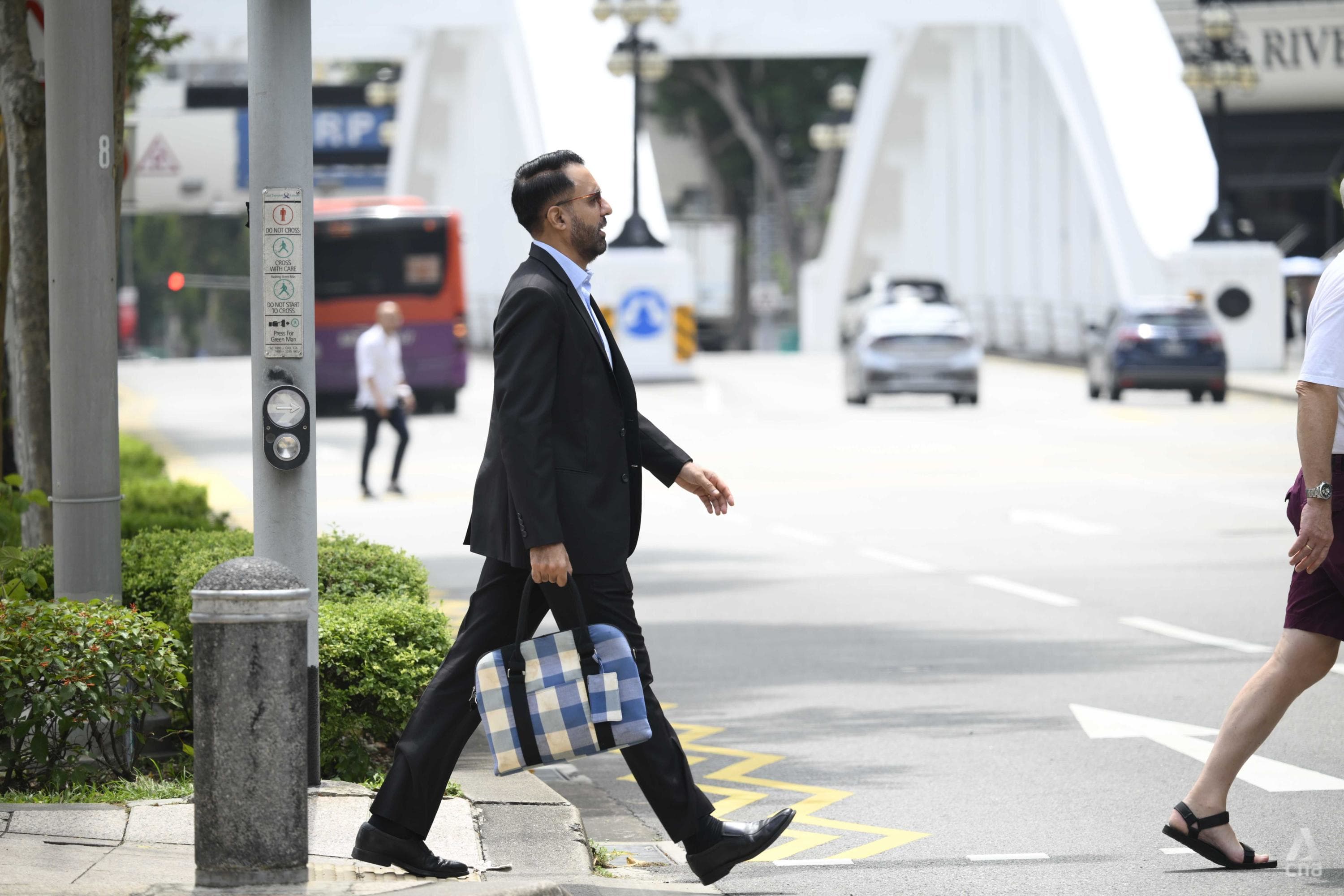Pritam Singh's appeal: Defence argues trial judge 'ignored' crucial evidence in convicting WP chief
Before reserving his judgment to a later date, Justice Steven Chong zoomed in on several issues and said he had trouble accepting some of the arguments by Pritam Singh's lawyer.

Pritam Singh arrives at the Supreme Court for his appeal hearing on Nov 4, 2025.

This audio is generated by an AI tool.
SINGAPORE: The lead defence lawyer for Leader of the Opposition Pritam Singh on Tuesday (Nov 4) sought to convince a High Court judge that the trial judge had “ignored” crucial pieces of evidence in convicting Singh of two counts of lying to a parliamentary committee.
Singh, 49, is appealing against his conviction and sentence – a S$14,000 (US$10,700) fine – stemming from how he dealt with a lie told by then-party member Raeesah Khan.
However, Justice Steven Chong found issues with several of the arguments put forth by Singh’s lawyer, Mr Andre Jumabhoy, and questioned him repeatedly about points he was making over about two-and-a-half hours on Tuesday morning.
Justice Chong also questioned several of the points made by lead prosecutor, Deputy Attorney-General Goh Yihan, asking him to address why the second charge was framed in a certain way. He reserved judgment to an unspecified date after hours of arguments.
BACKGROUND
Ms Khan had lied in parliament on Aug 3, 2021, about accompanying a rape victim to a police station, where the police allegedly made unsavoury remarks about the victim.
When questioned about it again in parliament by Law and Home Affairs Minister K Shanmugam, Ms Khan doubled down on her lie.
She confessed that her anecdote was false in a statement in parliament on Nov 1, 2021, and a Committee of Privileges later recommended that Singh and then WP Member of Parliament Faisal Manap be referred to the public prosecutor for further investigations.
Mr Faisal was issued a police advisory but was not charged. Singh was given two charges, which he contested in a highly publicised trial.
MR JUMABHOY'S ARGUMENTS
On Tuesday, Justice Chong opened by telling Mr Jumabhoy to address two key statements that led to the findings made by the trial judge.
These are: Ms Khan's claim that Singh had told her at a meeting on Aug 8, 2021, that the untruth was something they had to "take to the grave", and what Singh meant when he told Ms Khan, "I will not judge you".
Mr Jumabhoy said Ms Khan had given three accounts on the "take to the grave" statement, but she was inconsistent.
To this, Justice Chong said the fact that she did not use "take to the grave" consistently in the three versions does not mean it was not said.
He told Mr Jumabhoy that he had to "breach the logic" and address how Ms Khan's inaccuracies affected the authenticity of a statement she made contemporaneously on Aug 8, 2021.
Ms Khan had texted her aides, Ms Loh Pei Ying and Mr Yudhisthra Nathan on Aug 8, 2021 stating that the WP leaders, including Singh, had agreed that the best course of action was to take the information to the grave.
Mr Jumabhoy made several arguments, including that there was no consistency in what Ms Khan said and that she left out in her messages to her aides that Singh said they were "not going to do anything" about the lie.
At one point, Justice Chong told the lawyer: "Sometimes, you know, when a witness recites the same evidence over and over again, judges sometimes hold it against a witness for parroting a statement.
"So when a witness says something which is not entirely consistent, not entirely inconsistent either, it is for the judge to decide how that would impact on the witness' overall credibility. And that's the function of the judge. But I don't have that advantage. I have to examine this case on the basis of the transcript."
He told Mr Jumabhoy that he was not wrong to say there were differences. However, the question for him to consider was whether those differences are so material that he should doubt Ms Khan's credibility and find that what she said in her message to her aides was actually false.
"I think your submission about the differences ... might carry some persuasion if there was no WhatsApp message (from Ms Khan to her aides)," said Justice Chong.
"You cannot ignore the fact that ... immediately after the meeting (with WP leaders on Aug 8, 2021), she wrote that message to MS Loh and Mr Nathan."
The judge added: "Your case must be - she lied to her two aides. Or, actually, they all proactively, pre-emptively concocted this, this kind of alibi in anticipation that at some stage in the future, the truth might be exposed, and therefore, better pin the blame on somebody else first."
Mr Jumabhoy said he would not "go so far as to say that", but the judge said that is the "logical extension of the argument".
"I think what they wanted to do, and certainly what Ms Khan wanted to do, was to spare herself the national embarrassment of having to come out and say - I've lied," said Mr Jumabhoy.
"This is a perfectly logical and, you might say reasonable position, for her to take in relation to her self-preservation."

WHY DID SINGH DO NOTHING?
Justice Chong then questioned Mr Jumabhoy about Singh's conduct in the period between Aug 8, 2021 and Oct 3, 2021. This was after the WP leaders met Ms Khan on Aug 8, 2021, and before Singh met Ms Khan again on Oct 3, 2021.
"I think in your submission, you have emphasised that this untruth was actually quite a serious, grave matter," said Justice Chong.
"And one would expect, that if the decision was made on Aug 8 that you should take ownership, or at some point in time you have to come clean, it is expected that steps will be taken about drafting what to say, when to say and in what forum the untruth should be clarified.
"But what I find unusual is that it is common ground that nothing was done in that critical eight-week period."
He said it was Singh's evidence that there was "nothing much to prepare" because all that had to be done was to set up on Oct 4, 2021, when parliament sat and say the anecdote was a lie.
Justice Chong told Mr Jumabhoy that he needed to contrast this with what actually happened when they decided to clarify the lie, having drafts exchanged, in-person meetings and a need for Ms Khan to go before the WP's central committee to read a prepared statement.
"In that period ... is that consistent? With someone who wanted the truth to be clarified? Or someone who was prepared to let it be buried?" asked Justice Chong.
In response to Mr Jumabhoy's answers, the judge said he could accept that Singh would be sensitive, given the context that Ms Khan was the subject of sexual assault herself.
"I accept that because the normal reaction of a person would be to be sensitive, to empathise with Ms Khan, that you do not harass her repeatedly," said Justice Chong. "But we are not there. We are dealing with a case that has a complete absence of any discussion."
Mr Jumabhoy then explained that Ms Khan's lie was not the only thing Singh had on his agenda at that point - he had other things which were "as pressing if not more so", and Ms Khan was not attending parliament in that period as she had shingles.
In response, the judge said: "I don't think it can be seriously denied that the office of an opposition member, especially the Leader of the Opposition, will be busy. There's no question about that.
"The question is - was he so busy that he didn't deal with this pretty important pressing matter at all?"
He said that even if Singh felt he should allow Ms Khan some space, in the interim period, there was no discussion with the other party leaders either.
"During this period, there was no discussion with Ms Loh, or Mr Nathan - I don't think they had shingles at that time," said the judge. "And shingles, as you know, it's like chickenpox. It's not life-threatening."
He added that he knew "something about shingles" and said "you can still function".
Justice Chong went on to say that steps were taken immediately after the WP leaders had a meeting with Mr Low Thia Khiang on Oct 11, 2021.
He asked that if there was a basis for the trial judge to find that the view changed around Oct 11 or Oct 12, 2021, that the party had to come clean and clarify the truth, and if it occurred after the meeting with Mr Low, then would it not be logical that prior to that, the position was not to clarify the untruth.
"That would be logical, yes," acknowledged Mr Jumabhoy.

ABOUT WANTING MS KHAN TO SPEAK TO HER PARENTS
Justice Chong also questioned the lawyer on his point that Singh's position after the Aug 8 meeting was for Ms Khan to speak to her parents about her sexual assault, and that was why he did not do anything in the interim until Oct 3, 2021.
He pointed out that, when the decision was eventually made for Ms Khan to come clean, Singh did not know whether Ms Khan had spoken to her parents.
"It does cut against his case, that the condition precedent was the reason why he didn't pursue the matter with Ms Khan," said Justice Chong.
"You see, Mr Jumabhoy, this is an appeal. My task, and your task, is to persuade me that the findings made by the district judge were against the weight of the evidence or just inherently unreliable."
Mr Jumabhoy agreed that when Singh met Ms Khan on Oct 3, 2021, "there was no questioning" of Ms Khan on whether she had spoken to her parents.
The judge interjected: "In fact, I would say right up to Nov 1 (2021), even when her personal statement was made (confessing the lie). Even before the preparation was done of the personal statement, Mr Singh still didn't know whether Ms Khan had spoken to her parents."
Mr Jumabhoy said that by then, the situation had "dramatically changed" because Ms Khan had doubled down on her lie.
"I WON'T JUDGE YOU"
On the phrase "I won't judge you", which Singh said to Ms Khan on Oct 3, 2021, a day before parliament sat again and a day before she doubled down on her lie, Justice Chong said the phrase was "not a term of art".
He said this was not an uncommon expression.
"Typically, you will say 'I will not judge you' in a context where the person is doing something which is not quite right," said Justice Chong.
"But if you don't want to do the right thing, I will not judge you. It will be odd to say – I will not judge you, in the context where the person is going to do the right thing."
The judge then asked Mr Jumabhoy if he found that Singh did tell Ms Khan to take the lie to the grave, then would it not logically follow that the phrase "I will not judge you", in the context of that finding, could only mean "I will not judge you if you continue to maintain the narrative".
At this, the defence lawyer was quiet for a bit before accepting that it would be logical.
Justice Chong also questioned the defence's case that Singh had told Ms Khan on Oct 3, 2021, in no uncertain terms that if the matter came up in parliament, she had to come clean and clarify the untruth by taking ownership and responsibility.
He said there was "no choice" in this, but if so, why did Singh say in the disciplinary proceedings recorded on Nov 29, 2021, that he said "it's her call".
"And how do you explain that Mr Singh also said ... 'look at the choices you've made'. So how do you explain these words? If the decision was made that you have to come clean, it's no longer your choice," said Justice Chong.
Explaining the record of WP's disciplinary proceedings where Singh was recorded by Ms Sylvia Lim to say "it was your call" to Ms Khan, Mr Jumabhoy said the notes were taken by Ms Lim and these were "not Mr Singh's choice of words".
"So how do you expect me to intervene to say, yeah, I agree with you, that Ms Lim recorded it wrongly?" asked the judge.
Mr Jumabhoy responded that he was not pointing to just one aspect, but that if a person reads the judgment convicting Singh "comprehensively", there are "whole aspects" the judge does not deal with.
"No, the significance, Mr Jumabhoy, is - to say it's your choice, your call, cuts against the case that - I told you, if it is raised in parliament, you have to clarify the untruth. No choice. It cannot be your call anymore," said the judge.
After Mr Jumabhoy concluded his submissions, Justice Chong told Deputy Attorney-General Goh Yihan that he would need to address why the second charge was framed in that way.
When the hearing broke for lunch, Singh went across the road to attend parliament.

PROSECUTION GIVES MULTIPLE PIECES OF EVIDENCE FOR THEIR CASE
Addressing the court after the lunch break, Mr Goh first gave a brief answer on why the charge was framed that way - he said the prosecution thought it was the "most direct way" to frame it when looking at the COP testimonies.
Mr Goh then argued that Singh had made key omissions in his arguments, including the trial judge's "careful and thorough finding" that Singh was not a truthful witness.
"We say that at the outset this severely undermines the appellant's case," he said.
Mr Goh tendered a document summarising eight instances in which the trial judge had found that Singh was inconsistent or incoherent in a way that affected his general credibility.
Mr Goh also showed the court Singh's answers to the COP, where he said he did use the words "your call" when telling Ms Khan what to do at a meeting.
He said this completely contradicted what Mr Jumabhoy told the court earlier, that Singh had not used that phrase.
Mr Goh said that the examples showed that the trial court's finding on Singh's credibility should be upheld by the High Court.
To this, Justice Chong said: "Personally, I don't find this sort of general submission particularly useful in an appeal."
He said the court would still need to address the points of whether or not Singh made certain statements, and that general submissions "attacking credibility in a vacuum" were not "particularly appealing" to him.
Mr Goh then attacked Mr Jumabhoy's arguments that Ms Khan's accounts were inconsistent and should be used to impeach her credibility or undermine the prosecution's case.
He said Ms Khan did not admit to a plot to bury the lie, and the defence did not put the serious allegation of being involved in a conspiracy to Ms Loh or Mr Nathan.
As for the messages exchanged, Mr Goh said it was undisputed that Ms Khan in her messages to her aides had correctly recounted what she was to do about the Muslim issues which were also discussed on the Aug 8 meeting.
Mr Goh also argued that there were five key pieces of evidence corroborating the first charge that Singh told Ms Khan to take the lie to the grave.
These include the WhatsApp message from Ms Khan to her aides, the two aides' testimonies, Singh's inaction in raising the issue even once to Ms Khan between Aug 8 and Oct 3 in 2021 and Singh's failure to raise the anecdote with Ms Lim and Mr Faizal after the Aug 8 meeting, or with Ms Loh and Mr Nathan after their Aug 10 meeting.
These "fully corroborate" Ms Khan's account of what transpired on Aug 8, 2021, said Mr Goh.
As for Mr Jumabhoy's point that Singh was busy with other party members, Mr Goh pointed out that Singh was able to send Ms Khan an email in September about parliamentary questions, to take Ms Loh and Mr Nathan on a private tour of his parliamentary office and give Ms Khan advice on whether to speak to a mosque committee about the Muslim issues.
Mr Goh said Singh's explanation as to what happened on Aug 8 is "unbelievable", as the trial judge had found.
NOT A SINGLE THREAD OF DOCUMENTARY EVIDENCE: DAG
"The most crucial point is this - that the appellant has not raised a single thread of documentary evidence documenting his alleged instruction to Ms Khan for her to talk to her parents first," he said.
Mr Goh also cast doubt on Singh's claim that he had told Ms Khan on Oct 3, 2021, to clarify the lie the next day in parliament.
He said the meeting was in the evening and parliament sat the next day, giving Ms Khan very little time to prepare the statement.
"Surely the appellant, a seasoned politician, would have known this, and for him to say otherwise, we say is unbelievable," said Mr Goh.
He also pointed out that the WP disciplinary panel's report submitted to the WP's Central Executive Committee did not contain the fact that Ms Khan had repeated the lie, in disobedience to Singh's alleged instruction to her.
But this argument did not quite cut ice with Justice Chong, who said that even if Singh did try to "sanitise" certain things which were "not so rosy as far as the image of the party was concerned", this was a political party and reputation was important, and he struggled to see how it would affect the court's assessment.
"I agree with you certain things are not there. It does not mean, therefore, that it must mean that they suppressed what is otherwise the truth," said the judge.
On the second charge that Singh lied about wanting to tell Ms Khan on Oct 3, 2021 that she had to clarify her lie the next day if it came up, Mr Goh similarly gave five pieces of corroborative evidence.
One of these was Singh's inaction in parliament on Oct 4 and Oct 5 in 2021, after Ms Khan doubled down on her lie.
Justice Chong said it was unremarkable that Singh did not stand up in parliament to set the record straight, as it was "not realistic to expect him to immediately react".
"As the events subsequently demonstrate, that statement needed some serious drafting. So you have to collect your thoughts as to what to say, how to say," said the judge.
He added: "The point I think which the judge found troubling is that there was no reaction to that repetition of the lie during the Oct 4, 2021 sitting." Mr Goh agreed.
Mr Goh ended with a quote from another case stating that it is not the role of the appellate court to retry the case, and urged the court to dismiss the appeal entirely.
Justice Chong said the court would reserve judgment and inform parties when the judgment is ready to be delivered.
The penalties for the charges of wilfully making false answers to questions material to the subject of inquiry before the Committee of Privileges, under the Parliament (Privileges, Immunities and Powers) Act, are a maximum jail term of three years, a fine of up to S$7,000, or both per charge.

















